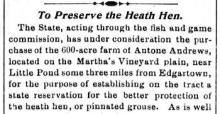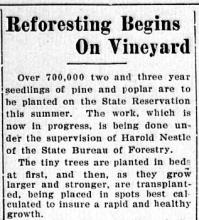Leaders for the the new Conservation Partnership of Martha's Vineyard and the Martha's Vineyard Land Bank have pledged full cooperation with one another, announcing among other things that they will begin to hold regular meetings to exchange information pertinent to the conservation movement.
"The land bank is committed to meet with the partnership monthly, to talk about specific properties and also priorities," said land bank executive director James Lengyel.
"We have agreed to share our information," said Henry A. Tilghman, who is chairman of the conservation partnership.
Although the relationship is informal, the announcement is important because it signals the end of a deep rift that has marred the relationship between the public land bank and the private conservation groups for some time.
Four leading conservation groups on the Vineyard announced late this summer that they had formed an alliance to accelerate the land protection movement and increase public awareness about the consequences of growth.
Last month leaders of the partnership and the land bank conceded the need for unity and took the first steps toward healing the rift. Strained relations between the land bank and the conservation groups is rooted in a series of misunderstandings surrounding an up-Island conservation purchase several years ago.
Mr. Tilghman and Mr. Lengyel both met with the Gazette last week to discuss the new relationship.
They said a meeting was held two weeks ago between representatives for both the partnership and the land bank, and they described the meeting as very productive. Both groups have agreed to continue meeting on a monthly basis and among other things, they will begin to share information that is stored on a database.
The conservation partnership has begun to assemble a database of Vineyard properties of 20 acres or more, and the land bank already has an extensive database that draws on recorded real estate transfers and is catalogued in numerous ways.
Created 10 years ago by an act of the state legislature, the land bank collects a two per cent transfer fee on most real estate transactions. The money is used to buy and manage public conservation lands.
Mr. Tilghman said the land bank has much to offer the conservation partnership.
"What I learned from the meeting is that James Lengyel keeps extremely good notes on his negotiations and is extremely well versed in these matters," said Mr. Tilghman. "I was also very interested to hear about the land bank's excellent work on its appraisals."
The conservation partnership has drafted a letter to send out to some 190 Vineyard landowners who own 20 acres or more; the letter is a first step toward educating landowners about the value of conservation easements. Mr. Tilghman said he expects this work will take time, but eventually the partnership hopes to make inroads by protecting more land through conservation restrictions and other methods.
To that end, the partnership is also creating a full-time, two-year position for a coordinator, advocate and public relations professional to help carry out the goals of the partnership.
The partnership is putting out an urgent plea for funds to cover the salary of this position. Mr. Tilghman estimates the salary will be $30,000 or higher. The partnership also needs to raise money to cover some $1,200 in costs for printing a booklet that outlines the mission of the group. The booklet includes a detailed research report that uses maps, charts and an array of statistical information culled from various sources to paint a picture of the Vineyard over the next 10 years. Among other things, the report finds that if development continues at its present rate, the Vineyard will be completely built out in just eight years.
The four conservation groups in the partnership are Sheriff's Meadow Foundation, the Vineyard Conservation Society, The Trustees of Reservations and The Nature Conservancy.
Mr. Tilghman said the partnership will need funds to complete its mission.
"For Sheriff's Meadow to double the rate of its land acquisition, we have to take some people who are part-time and make them full time. Land acquisition itself is pretty expensive and difficult to do. And the more land we acquire, the more land we have to manage — our biggest cost is management of the land," he said.
Mr. Lengyel agreed, noting that land management costs now account for some $500,000 of the annual land bank budget.
He also said his vision for the future includes the possibility of the land bank offering management services to the conservation groups on a contract basis.
Mr. Lengyel and Mr. Tilghman also discussed the broader goals of accelerating the land acquisition movement, revealing along the way two conservation creeds which are related but distinctly different.
"What this really means is addressing the attitude of landowners — we want to help people understand that this is a special place and sometimes there are places where there shouldn't be a swimming pool, places where things should be left in their natural state," said Mr. Tilghman.
"It's not enough to say that you can save money through conservation restrictions — this place is really priceless and if people can see that, then the most wonderful thing that you can do with your land is to own it so graciously that you are willing to do something for other people. It may be Pollyana-like, but that is our task."
Mr. Lengyel, who has spent many years negotiating property sales, had a more pragmatic view.
"You have the powers of persuasion and good will, but mostly the people who own land these days are interested in the economics. You price land as fairly and as objectively as you can, and then when you are asked to pay a premium, you ask yourself the hard question of whether you are willing to pay it. And if you are not, you live with the consequences," he said.
Concluded Mr. Lengyel: "When the land bank read the quantitative goals [of the conservation partnership], it said, 'Terrific, hope it happens, but the land bank has a basketful of failed negotiations. It is certain that we will have more disappointments — but let's try.'
"I just hope we can win more than we lose."









Comments